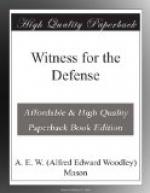Harold indeed had inherited Little Beeding by an accident during the first summer after Stella had gone out to India. Arthur Hazlewood, the owner and Harold’s nephew, had been lost with his yacht in a gale of wind off the coast of Portugal. Arthur was a bachelor and thus Harold Hazlewood came quite unexpectedly into the position of a country squire when he was already well on in middle age. He was a widower and a man of a noticeable aspect. At the first glance you knew that he was not as other men; at the second you suspected that he took a pride in his dissimilarity. He was long, rather shambling in his gait, with a mild blue eye and fair thin hair now growing grey. But length was the chief impression left by his physical appearance. His legs, his arms, his face, even his hair, unless his son in the Coldstream happened to be at home at the time, were long.
“Is your father mad?” Mr. Chubble once asked of Dick Hazlewood. The two men had met in the broad street of Great Beeding at midday, and the elder one, bubbling with indignation, had planted himself in front of Dick.
“Mad?” Dick repeated reflectively. “No, I shouldn’t go as far as that. Oh no! What has he done now?”
“He has paid out of his own pocket the fines of all the people in Great Beeding who have just been convicted for not having their babies vaccinated.”
Dick Hazlewood stared in surprise at his companion’s indignant face.
“But of course he’d do that, Mr. Chubble,” he answered cheerfully. “He’s anti-everything—everything, I mean, which experience has established or prudence could suggest.”
“In addition he wants to sell the navy for old iron and abolish the army.”
“Yes,” said Dick, nodding his head amicably. “He’s like that. He thinks that without an army and a navy we should be less aggressive. I can’t deny it.”
“I should think not indeed,” cried Mr. Chubble. “Are you walking home?”
“Yes.”
“Let us walk together.” Mr. Chubble took Dick Hazlewood by the arm and as they went filled the lane with his plaints.
“I should think you can’t deny it. Why, he has actually written a pamphlet to enforce his views upon the subject.”
“You should bless your stars, Mr. Chubble, that there is only one. He suffers from pamphlets. He writes ’em and prints ’em and every member of Parliament gets one of ’em for nothing. Pamphlets do for him what the gout does for other old gentlemen—they carry off from his system a great number of disquieting ailments. He’s at prison reform now,” said Dick with a smile of thorough enjoyment. “Have you heard him on it?”
“No, and I don’t want to,” Mr. Chubble exploded.
He struck viciously at an overhanging bough, as though it was the head of Harold Hazlewood, and went on with the catalogue of crimes. “He made a speech last week in the town-hall,” and he jerked his thumb backwards towards the town they had left. “Intolerable I call it. He actually denounced his own countrymen as a race of oppressors.”




